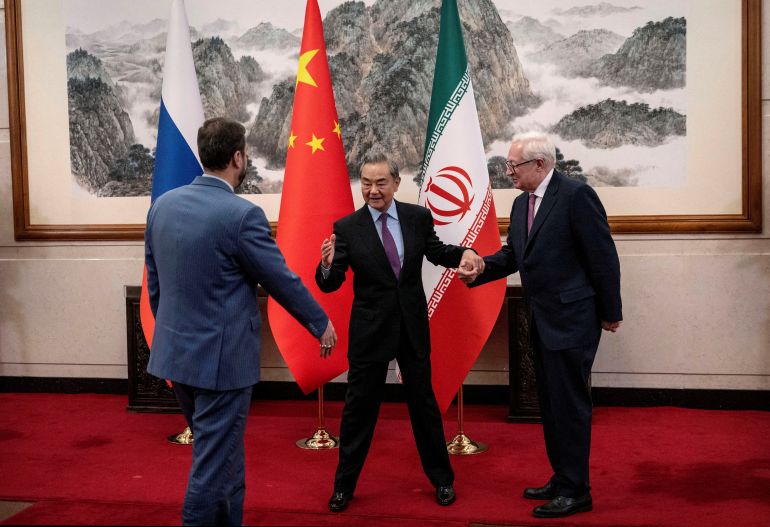In the midst of a tense regional crisis, China quickly asserted itself as a potential mediator and voice of reason during the recent Israel-Iran conflict.
Beijing reached out to both sides the day after Israel launched an unprovoked attack on Iran on June 13 while Wang Yi, the country’s top diplomat, criticized Israel’s actions as a violation of international law.
China immediately reaffirmed its commitment to de-escalation, and in response, China joined Russia and Pakistan in calling for an “immediate and unconditional ceasefire” at the UN Security Council.
Beijing was also quick to express its opposition when Iran threatened to block China’s strategically significant Strait of Hormuz, through which 20% of the world’s oil flows.
Instead, the Ministry of Foreign Affairs urged the “international community to intensify efforts to de-escalate conflicts and stop regional unrest from having a greater impact on global economic development.”
Beijing has remained committed to its long-standing non-interference policy toward foreign hostilities throughout the conflict. However, according to experts, it exposed the limitations of its influence in the region and failed to support its efforts to become a powerful player there.
Why did China worry?
China typically approaches foreign policy “through a lens of strategic pragmatism rather than ideological solidarity,” according to Evangeline Cheng, a research associate at the National University of Singapore’s Middle East Institute.
According to Cheng, this strategy leaves China with a focus on preserving its economic interests, which it has a lot in the Middle East.
China has investments in Israel’s expanding tech sector, and its Belt and Road infrastructure project covers Qatar, Oman, Kuwait, Iraq, Egypt, and the United Arab Emirates.
Critically, China imports Iranian oil from the Middle East for more than half of its crude oil, and it is the largest importer of Iranian oil. Iranian blockade of the strategically important Strait of Hormuz, which Tehran’s parliament threatened during the conflict, would have slowed down its oil supplies.
Alam Saleh, a senior lecturer in Iranian studies at the Australian National University, said that “war and security instability not only undermines Chinese investment, trade, and business, but also the general security of oil prices and energy.”
China seeks stability, and it opposes and disagrees with any kind of military solution to any kind of conflict or conflict, he said.
According to John Gong, an economics professor at Beijing’s University, the main concern with the conflict was avoiding “skyrocketing oil prices,” which would threaten China’s energy security.
flexing diplomatic muscles, preserving economic might
US Secretary of State Marco Rubio demanded that Beijing keep Iran from severing the Strait of Hormuz as ceasefire negotiations drew to a close this week in light of China’s friendly relations with Iran and Beijing’s economic worries.
Beijing’s influence was briefly acknowledged, but experts claim that China’s overall diplomatic influence is still subdued.
China’s offer to mediate highlights its desire to be seen as a responsible global player, Cheng said. However, its actual influence is still limitless. China’s role is always constrained because it lacks military might or significant political influence in the region and because Israel is wary of Beijing’s ties to Iran.
Beijing has undoubtedly demonstrated its ability to broker significant diplomatic agreements in the area. It facilitated the normalization of Saudi Arabian and Iranian relations in 2023. Although Beijing is regarded as a significant diplomatic success, experts claim Oman and Iraq, two of its mediators, contributed a large portion to its success. After Israel’s ongoing conflict with the enclave, China also mediated a deal reached between Palestinian factions, including Hamas and Fatah, in July 2024.
However, according to William Yang, a senior analyst for Northeast Asia at the Brussels-based International Crisis Group, Israel’s stance toward Iran has been a factor in the recent conflict.
Iran is a key player in the Belt and Road project, and China and Iran signed a 25-year “strategic partnership” in 2021. Iran has also partnered with China’s Shanghai Cooperation Organization and participated in “Maritime Security Belt” naval exercises this year.
In contrast to Israel’s close ties to the US, Yang said, Iran’s “resolute opposition to American hegemony” also aligns well with China’s diplomatic interests in general.

China’s plight: a dilemma
He claimed that the situation has the potential to be repeated in the future.
China’s situation is underscored by this case, which also highlights the difficulty it faces: while it tries to be seen as a great power capable of bringing up major global conflicts, Beijing’s ability to play a key role is diminished, according to Yang.
Beijing will continue to rely on the US as a security guarantor in the area, he said.
“China will continue to emphasize expanding its economic ties with Middle Eastern nations while profiting from the region’s US presence, which continues to be the region’s primary security guarantee,” Yang said.
Source: Aljazeera

Leave a Reply